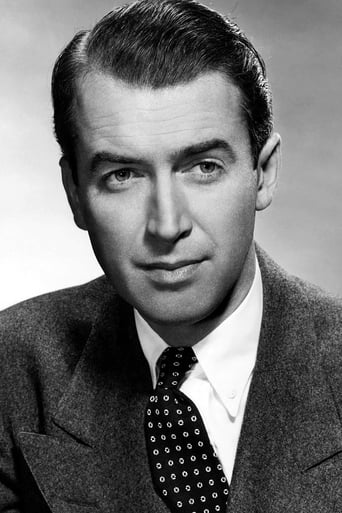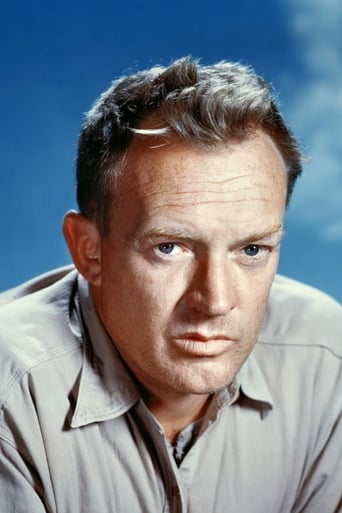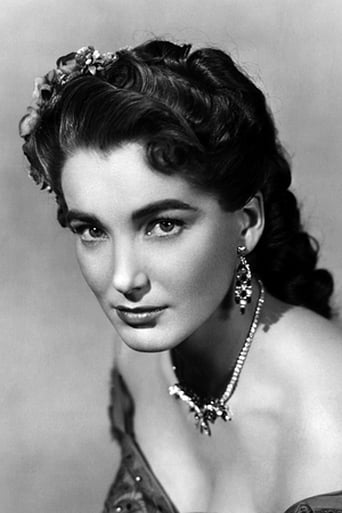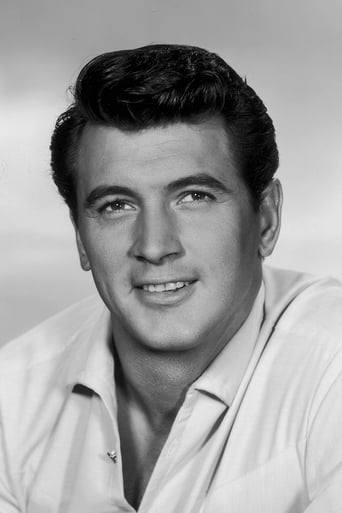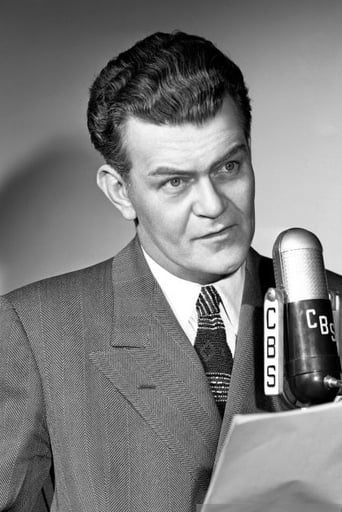secondtake
Bend of the River (1952)A Technicolor Anthony Mann Western starring Jimmy Stewart. That says a lot already, and you might just remember that Mann and Stewart did 5 Westerns together (this is the 2nd, and the first in color) and they all have what you might just call integrity. Each is a bit different, and this starts by being one of a handful of Westerns that focus on Oregon.It's before the Civil War, and the innocent pioneers have Stewart, who is unnaturally good at detecting and fighting Indians, as their guide and protector. Lucky for him (early in the plot) he saves Arthur Kennedy playing another man with a mysterious past, and the two team up.There is a lot of nice filming here, not widescreen so it's tightly composed, including some rather nice day-for-night stuff that is convincing and has great restrained color. If you are squeamish about the characterization of Native Americans as ruthless killers, then the beginning to this story isn't for you. All stereotypes (true or not) are intact, but they are realistic and vigorous enough to work the plot, including some guerrilla warfare scenes, over-simplified but good drama.Later, there are more archetypes that might seem like clichés if you want to see it that way. But focus on the unique qualities, the big plot twist half way in, the use of some African-American bit actors (who are given painfully stereotypical roles), and the grinding moral certitude that makes the main character, McLyntock, one reason Jimmy Stewart is admired for the movie. And oh, yeah, a young and not totally convincing Rock Hudson shows up, too.The real conflicts here are between settlers, all pushed to their limits by food shortages and high mountains. Distrust turns to treachery turns to murder. And the love story beneath it all, which has no real grit, wins the day. The story has some jumps and a few places you have to let the improbable be possible. But things keep moving fast and it's a good ride overall.
Evelyn Danielle
Being a huge movie buff, I had thought I had seen every western film ever made with the leading actors of the mid-20th century. We purchased a DVD with 4 old westerns starring James Stewart - "Bend of the River" was the first on the disk. I had never heard of it, but the cast included Rock Hudson and Harry Morgan so I thought it would be interesting at least.It started out with action right from the start - which really caught me off-guard. I kept thinking to myself that it must get really slow/boring/stupid or something to merit it's lack of public awareness. Not so - this film kept me completely rapt with all its twists and turns.The writing was incredible - comedy, drama and human angst all combined within a scene and then again, and again throughout the story. You felt you could relate to each character, no matter how minor or repugnant their role.I am also a history buff with respect to ghost towns and the Gold Rush. What I have read about the real prospectors and the greedy businessmen who preyed on their pursuit of riches only enhances the believe- ability of this story.Regardless of the goofs, errors or historical/geographical inaccuracies that have been listed within this site - this movie is a real gem.
weezeralfalfa
Very entertaining and colorful combination of character study, complicated plot, gun play, wagon train realism, beautiful eligible young women, and fantastic on site scenery in the Mt. Hood and nearby Columbia River region, all in crisp Technicolor. Whereas John Ford liked to site his westerns in the dry Southwest, Anthony Mann preferred the verdant Pacific Northwest, also evidenced in "The Far Country" and "The Last Frontier", for example.On the down side, there are some problems with historical, physical and psychological realism. I am confused just when this story supposedly takes place. According to Wikipedia, it occurs in 1847. But, several features of the screen play say that can't be, and nothing in the film indicates the year. Jimmy Stewart's and Arthur Kennedy's lead characters are both former participants in the Missouri-Kansas border wars, which didn't begin until after Kansas was made a territory in 1854, continuing through the Civil War. Then, there is the matter of the gold rush. We might be generous in assuming that the screenwriter was thinking of the 1862 strike in the Blue Mtns.,relocated to the Mt. Hood area. Riverine steamboats first began to ply the lower Columbia in 1850, although none were named "River Queen", as was a famous East Coast(not Mississippi) steamer. As depicted, the Shoshone(or Snake) tribe did have many skirmishes with settlers and the US army in the 1850-60s. However, it took 6 months to complete the Oregon Trail. Thus, a spring arrival, as stated, isn't feasible, horses(as shown) rarely pulled the wagons, and the Little Bighorn(as Kennedy questions) was irrelevant.The later Mann-Stewart film "The Far Country" exhibits many similarities to this film. Both involve Stewart as a traveling loner, with a price on his head for murder. Both were mainly shot in the Cascades or Canadian Rockies, and both involve a gold rush as central to the story. In both films, there is fighting over the ownership of food desired by the miners. Stewart mostly has a partner, who eventually is killed. There are two central young women in both. Stewart nicknames the younger of the two 'funnyface' to denote that he thinks them too immature as a romantic interest for him...There are some important differences. In the later film, Stewart's character is the quintessential anti-hero: not interested in getting involved in other people's problems. In this film, he is repeatedly a hero, risking his life to help others. Also, his traveling buddy(Kennedy) in most of this film, whom he saves from a lynching, without knowing the details, eventually becomes his arch enemy, whom he must kill to fulfill his mission of delivering essential supplies to the settlers whom he guided to Oregon. Kennedy's character(Emerson Cole), as well as Tom Hendricks, the steamboat owner who promised to deliver supplies to the wagon train settlement, then reneged when he could sell them at a much higher profit to miners, represent men whose sense of duty is overcome by greed, in contrast to Stewart's character. The point is that Jeremy Baile's(Jay Flippen) expressed distrust of men with a violent period in their past(Stewart's and Kennedy's characters), who seem reformed, is sometimes justified and sometimes not. The latter may revert to their former selves, given sufficient reason and opportunity. In Kennedy's case, it was the mutiny of the gang of helpers in getting supplies to the settlement, and Stewart's refusal to join him and them in redirecting these supplies to the miners that instigated his changed attitude. Kennedy argued that the settlers(and the justice system) would hold their past against them forever, once they were found out. Stewart admitted this was a possibility, but chose to take the chance that his repeated heroism on behalf of the settlers would absolve any doubts about his changed character.Chubby Johnson. as always cheery Cap'n Mello, provides unrealistically accommodating willingness to help Stewart and the settlers in their violent clash with his boss, Hendricks, over their due supplies. African American Stepin Fetchit displays his stock 'coon' character as Mello's seemingly retarded first mate.Stewart seems an unrealistic superman in his chase of the mutineers, just after having been thoroughly beaten up and left without a horse or firearm. Rock Hudson's enigmatic role as a professional gambler dandy, turned member of the settler's 'gang' is interesting. Why? He figures he owes Cole something for saving his life in a gambling dispute. Later, he seems to side with Cole during the mutiny(probably to save his skin!), then switches back to being Stewart's aid when the latter unexpectedly shows up. His consistent flippant attitude toward the obvious overtures of luscious Lori Nelson presumably reflects a message of desired independence, and we are left wondering if they become a couple. Mann usually left the romantic aspects minimally covered and mostly implied. Stewart refused to be cast with Rock again, after he got a bigger applause than Stewart at the premier.
Spikeopath
The second of five genre defining Westerns that director Anthony Mann made with James Stewart, Bend Of The River is the first one to be made in color. The slick screenplay is written by Borden Chase from William Gulick's novel "Bend Of The Snake," with support for Stewart coming from Arthur Kennedy, Julie Adams, Rock Hudson & Jay C. Flippen.Stewart plays guide Glyn McLyntock who in 1847 is leading a wagon- train of homesteaders from troubled Missouri to the Oregon Territory. What the group are hoping for is a new start, a paradise, with McLyntock himself hoping for a new identity to escape his own troubled past. But after rescuing Emerson Cole (Kennedy) from a lynching, it's an act that has far reaching consequences for McLyntock and the trail once they get to Portland.In typical Anthony Mann style, McLyntock is a man tested to the maximum as he seeks to throw off his shackles and find a new redemption within a peaceful community. Cloaked in what would be become Mann's trademark stunning vistas (cinematography courtesy of Irving Glassberg), Bend Of The River is often thought of as the lighter tale from the Stewart/Mann partnership; most likely because it has more action and no little amount of comedy in there. But although it's a simple story in essence, it is given a hard boiled and psychological edge by the makers. An edge that asks searching questions of its "hero" in waiting. Can "McLyntock" indeed escape his past? And as a "hero" is it OK to use violence when he is wronged? Potent stuff that is acted with tremendous gravitas by Stewart.Very recommended picture, but in truth all five of them are really. 7/10


